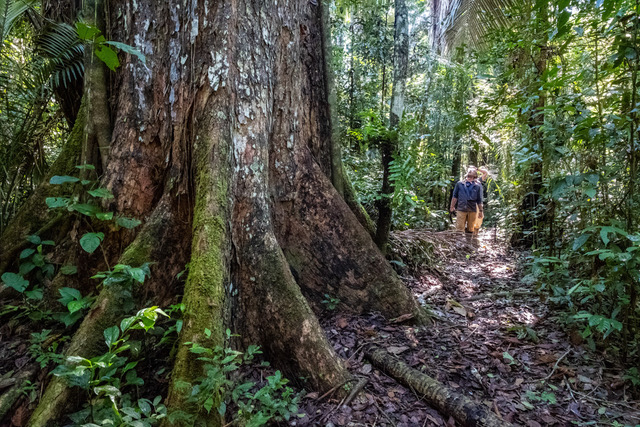
This gigantic mahogany is Cocha Cashu is a rich target for illegal timbering. If were to fall and be burned, it would release tons of sequestered CO2 and no longer provide the ecosystem service of absorbing air pollution. (That’s me in the background.) Photo by Jason Houston
On Oct. 8, 2018, the International Panel on Climate Change (IPCC) raised a bright red flag of warning for world leaders. In essence, the 91 climate scientists from 40 nations decried in a major report the lack of action on climate mitigation internationally. It made clear that time is running out. They warned that irreversible climate damage could lock in as early as 2040, not decades later, as previously hoped.
This story of mine, posted one week later, is largely in response to the IPCC report and is based on the research stemming from another group of climate scientists and advocates with the acronym CLARA — Climate, Land, Ambition and Rights Alliance.
As one source told me: “Our study is not meant to either contradict or complement the IPCC report,” said Doreen Stabinsky, a co-author of Missing Pathways. “The IPCC looks very generally at pathways to 1.5 degrees C. We dive into the literature to find what would be useful, specific contributions from the land sector to stay within a 1.5-degree pathway.”
Interesting context. Mongabay special editor Willie Shubert emailed me Thursday morning, Oct. 11, to ask if I could turn a story around quickly on the CLARA study and have it ready to post by Monday, Oct. 15. I agreed. I put calls out early Thursday afternoon and arranged for three telephone interviews on Friday. I knew Hurricane Michael, a climate-change-fueled monster, had made landfall in northern Florida at 155 mph a day earlier; I didn’t realize it was heading to central North Carolina. By Thursday afternoon, winds in Greensboro hit 50 mph as Michael swept through. Trees fell all over the Triad. Power and Internet went out in my neighborhood and around the region around 3:30 pm Thursday. It would not be restored until Sunday afternoon.
A sincere thanks to HQ Greensboro, the co-working space in downtown Greensboro, which never lost power or Internet service. I spent all day Friday, Saturday and Sunday there, doing my reporting, conducting my interviews, grading my Wake Forest assignments, and finally, writing the story linked here. My editor, Glenn Scherer, liked the irony that I was writing about climate mitigation while being directly affected by a climate-influenced event.

